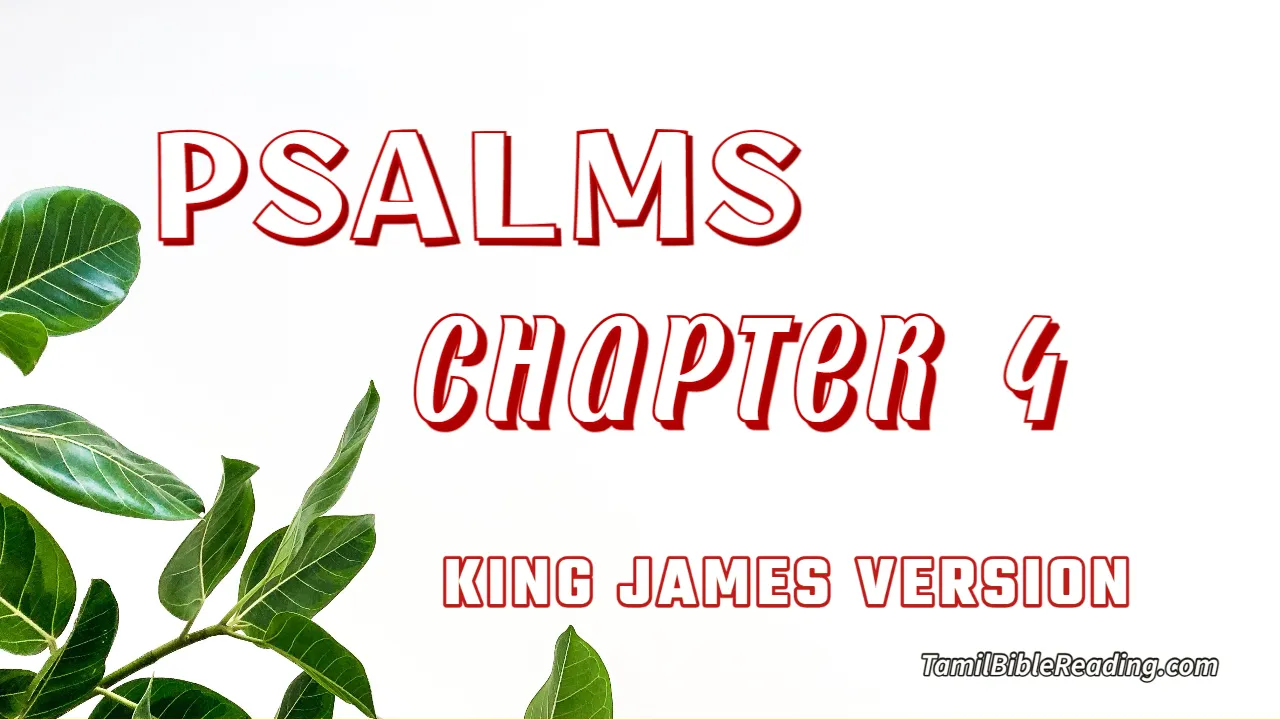Psalm 4 is the fourth psalm of the Book of Psalms, beginning in the English of the King James Version: "Hear me when I call, O God of my righteousness". In Latin, it is known as "Cum invocarem". The psalm is traditionally attributed to David, but his authorship is not accepted by modern scholars. The message in the psalm is that the victories of sinners are only temporary, and that only repentance can bring joy.
The psalm forms a regular part of Jewish, Catholic, Lutheran, Anglican and other Protestant liturgies. It has often been set to music, including works in Latin by Michel Richard Delalande, Henry Desmarest and Marc-Antoine Charpentier.
Context
Psalm 4 is traditionally attributed to David, but his authorship is not accepted by modern scholars. The psalm's Latin title is Cum invocarem.
The psalm's text is a reflection of David speaking to all sinners while addressing himself to Absalom. The message in the psalm is that the victories of sinners are only temporary and meaningless, and that only repentance can bring true happiness. It is a request to God for deliverance from past distresses.
This is the first psalm with a musical instrument, strings, mentioned in the title. There also was a 'selah' ending the previous psalm, Psalm 3. There is, however, no agreement what 'selah' meant. Popular modern views might include a pause, a reflection or a lifting. Poetically, if selah is a connection, it is as if David recited his Psalm 3, then paused and began to sing, continuing with his harp. The themes will be false and true worship, but also false and true satisfaction. 'They long for prosperity', David sings, but David has it and is more satisfied 'than when their grain and new wine abound'.
Many see a chiastic structure in the layout of this psalm.
Text
The following table shows the Hebrew text of the Psalm with vowels, alongside the Koine Greek text in the Septuagint and the English translation from the King James Version. Note that the meaning can slightly differ between these versions, as the Septuagint and the Masoretic text come from different textual traditions.
Uses
Judaism
- Verse 5 is part of the prayers of the Bedtime Shema.
- Verse 7 is part of the Prayer for Sustenance recited on High Holidays.
New Testament
Verse 4 is quoted in Ephesians 4:26.
Book of Common Prayer
In the Church of England's Book of Common Prayer, Psalm 4 is appointed to be read on the morning of the first day of the month.
Catholic Church
The psalm forms part of the Benedictine rite of the daily evening prayer Compline. After the Reform of the Roman Breviary by Pope Pius X it was only used on Sundays and Solemnities. In the Liturgy of the Hours it is part of Compline on the eve of Sunday and Solemnities.
Coptic Orthodox Church
In the Agpeya, the Coptic Church's book of hours, this psalm is prayed in the office of Prime. It is also in the prayer of the Veil, which is generally prayed only by monks.
Musical settings
While several composers set the whole Psalm 4, some writers and composers focused on the aspect of sleeping in peace, as a base for evening music.
Fanny Crosby wrote a hymn based on verse 8 in 1853, titled “An Evening Hymn", which she described as her first published hymn.
Heinrich Schütz composed a setting of a metred version in German, "Erhör mich, wenn ich ruf zu dir", SWV 100, published in 1628 in the Becker Psalter. Michel Richard Delalande wrote a great motet (S41) in Latin in 1692 for services celebrated in the royal chapel of Versailles. Henry Desmarest also wrote a great motet on the psalm. Marc-Antoine Charpentier composed around 1689 Cum invocarem exaudivit me, H. 198, for soloists, choir, flutes, strings and continuo. Desmarest, Nicolas Bernier, André Campra, wrote a great motet Cum invocarem exaudivit me. A plainsong version was included in H. B. Briggs and W. H. Frere's Manual of Plainsong published in 1902.
Max Drischner composed a setting of verses 7 and 9, combined with Psalm 74:16, as the final movement of his Tübinger Psalmen for voice, violin and organ, or choir, melody instrument and keyboard instrument, in 1948, titled "Ich liege und schlafe ganz mit Frieden".
Illuminated Manuscripts
Notes
References
External links
- Pieces with text from Psalm 4: Scores at the International Music Score Library Project
- Psalm 4: Free scores at the Choral Public Domain Library (ChoralWiki)
- Psalm 4 in Hebrew and English - Mechon-mamre
- Text of Psalm 4 according to the 1928 Psalter
- A psalm of David, when he fled from his son Absalom. / How many are my foes, LORD! / How many rise against me! (text and footnotes) United States Conference of Catholic Bishops
- Psalm 4:1 (introduction and text) biblestudytools.com
- Psalm 4 – Talking to God and Men enduringword.com
- Psalm 4 / Refrain: In peace I will lie down and sleep. Church of England
- Psalm 4 at biblegateway.com
- Hymns for Psalm 4 hymnary.org
- PSALMUS 04, Vatican City




